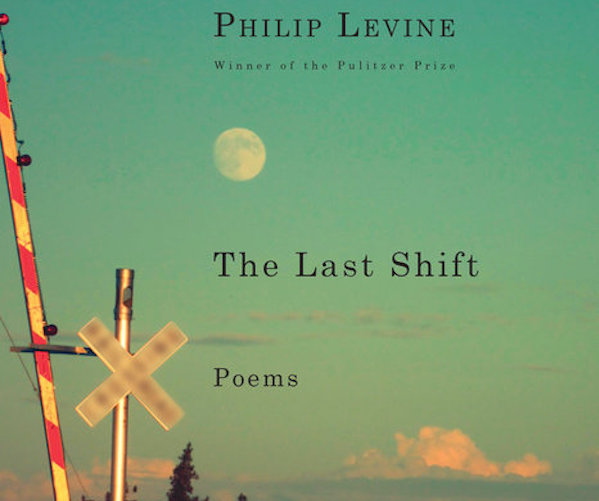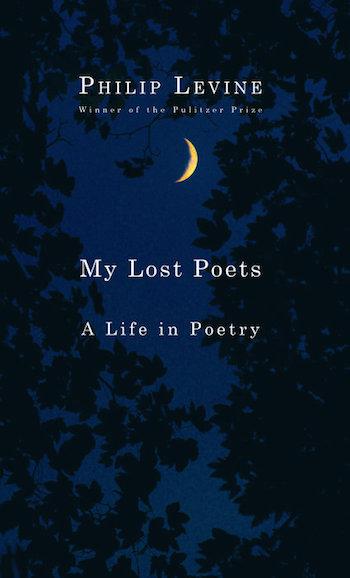Book Review: Poet Philip Levine — The Kernel of Life
These posthumous volumes provide ample proof that poet Philip Levine was far more than a proletariat troubadour.
The Last Shift, poems by Philip Levine. Knopf, 96 pages, $26.95
My Lost Poets: A Life in Poetry by Philip Levine. Knopf, 224 pages, $26.95.

By Robert Israel
The work of the late poet and essayist Philip Levine strikes a familiar chord in me: he captures the essence growing up in a Russian-Jewish immigrant community, an experience I share. Even though I came of age a generation later than Levine, I, too lived among neighbors and several members of my family who labored at industrial jobs on assembly lines, often late into the night. In summertime I was awakened by the lull in the conveyor motors across the street from our triple-decker, as men left one shift and other men arrived to begin another. I heard the sounds captured in Levine’s poem “Leaves”:
you told yourself, you could
hear the music of eternity.
More likely it was your own
breathing, new to the job,
or if not then the constant
rise and descent of the presses,
steadier than the beating
of your own heart.
–“Leaves”
Levine’s essays and poems in these two posthumous volumes take the reader back to the rhythms of his life in an industrial Detroit, which are very similar to the rhythms I heard growing up in Providence’s South End. They also evoke the harsh language of immigrants who, despite the reassurances of patriotic rhetoric, bemoaned facing yet another never-gladdening new day:
I still believed everything in dreams
meant something I could parse to discover
who we were.
–“Inheritance”
Levine’s vision of being first-generation American was shaped by an early epiphany: the dreams of his forebears were bittersweet and were inevitably accompanied by the ache of hard work sharpened by the pain of dashed hopes:
back in Russia, stories I half-believed
of magic escapes and revenge killings,
of the gorgeous Ukrainian girls they had.
–“1934”
Levine evokes the human costs of hard labor. His dedication to the revenges of the daily grind earned him the distinction of being called — in the New York Times‘s 2015 eulogy — a poet of “grit, sweat and labor.” Indeed, one finds several of poems about working in The Last Shift – “Assembly,” “Your Turn,” and “The Last Shift” – that take their place alongside his finest statements on the subject, particularly the verse in his 1991 volume What Work Is. While he did not want to be labeled a poet of the working class, Levine accepted, with equanimity that this is what he will be remembered for. “There’ll always be working people in my poems,” he admitted, “because I grew up with them, and I am a poet of memory. The irony is, going to work every day became the subject of probably my best poetry.”

Of course, Levine was far more than a proletariat troubadour. He taught for many years at Fresno State until his retirement. He spent the last decade of his life as a poet-in-residence at New York University. Along the way he won a Pulitzer Prize and two National Book Awards. He also served as Poet Laureate at the Library of Congress. His 2012 address in Washington, DC is the first piece in My Lost Poets, and he shares how he first knew that he had a gift for the lyrical: “I simply had no name for what I was doing … but had discovered a voice within myself I’d had no idea had been there, a voice that could speak of all the things I would never have dare share with anyone, a voice that tried to consider the value of being alive …” This discovery led him to the work of the Spanish poets, particularly Federico Garcia Lorca, and to a sabbatical in Spain.
It is difficult at this time for me to single out poems or particular essays in the two volumes because their contents so perfectly epitomize Levine’s precious voice — forged by “grit, sweat and labor” — which has now been silenced. Both books are commendable, readable, and enjoyable, and are worthy of repeat visits because they contain indispensable discoveries about “the value of being alive.”
I interviewed Levine several times during his visits to New England, and during our last chat, in Cambridge after he read his works at MIT, he told me he was moving away from the elegiac tone found in many of his works. Instead, he was seeking to imbue his poems with “more love.”
He succeeded. Take, for example, his gentle descriptions of his often quarrelsome grandparents – whom he refers to as Bubbie and Zayde, Yiddish terms of endearment. Or the accumulation of poems that express an awe of nature, particularly of landscapes he visited. Yes, much of his work is harsh, and that is understandable; he is not shy about unleashing anger at how shabbily human beings are treated in this pitiless world, particularly in the capitalist workplace. Still, his last writings mingle indignity with compassion, reflecting his interest in embracing what he told me was “the kernel of life” he found within himself, and in others.
Robert Israel writes about theater, travel, and the arts, and is a member of Independent Reviewers of New England (IRNE). He can be reached at risrael_97@yahoo.com.
